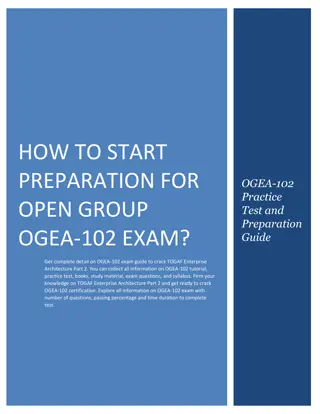
Prophet Muhammad's Illness: Controversy and Narratives
The narrative of Prophet Muhammad being poisoned after the Battle of Khaybar has sparked debates and alternative theories among Muslims. While the traditional belief attributes his death to poisoning, contemporary Shia scholars have proposed alternative scenarios, including a conspiracy involving Aisha. This article explores the various accounts and challenges surrounding Prophet Muhammad's illness and eventual demise.
Download Presentation

Please find below an Image/Link to download the presentation.
The content on the website is provided AS IS for your information and personal use only. It may not be sold, licensed, or shared on other websites without obtaining consent from the author. If you encounter any issues during the download, it is possible that the publisher has removed the file from their server.
You are allowed to download the files provided on this website for personal or commercial use, subject to the condition that they are used lawfully. All files are the property of their respective owners.
The content on the website is provided AS IS for your information and personal use only. It may not be sold, licensed, or shared on other websites without obtaining consent from the author.
E N D
Presentation Transcript
The Life of Prophet Muhammad Lesson 102
The Prophets Illness It is widely acknowledged among Muslims that the Prophet (s) departed from this world due to an illness. Many have attributed this to poison he consumed following the Battle of Khaybar, an event corroborated by numerous reports. One of the earliest attestations to this understanding from a Shia scholar is found in the writings of Shaykh Saduq, who states: . Our belief regarding the Prophet (s) is that he was poisoned during the Battle of Khaybar, and this poisoning continued to affect him until it severed his aorta, leading to his death.
The Prophets Illness This incident is not only reported in Sunni works, but it is also recorded in Shi a works such as: . : Imam Sadiq (a) said: The Messenger of God was poisoned on the day of Khaybar, and the meat spoke to him and said, O Messenger of God, I am poisoned. So the Prophet (p) said at the time of his death, Today the food which I ate on Khaybar has cut up my body. There is no Prophet nor an executor except that they are shaheed. Source: Basa ir al-Darajat, pg. 503
The Prophets Illness There is also narration in Usul al-Kafi as follows: : Ibn al-Qaddah said: I once heard Imam Sadiq (a) say, The Jewish woman poisoned the Holy Prophet with shoulder meat and the Holy Prophet liked it greatly but he disliked meat from the hip area because it is close to the urinating part. Source: Al-Kafi Vol. 6, pg. 315
The Prophets Illness The narrative of the Prophet (s) being poisoned after the Battle of Khaybar has been accepted by many Muslims over the centuries. However, this account has not been without its challenges and questions. For instance, how could the Prophet have consumed the poisoned meat offered by a Jewish woman at Khaybar, and how could such poison linger in his body for years before taking its toll? In modern times, some contemporary Shia scholars have entertained an alternative theory, proposing that the Prophet (s) may have been poisoned not once, but twice once at Khaybar, which seemingly did not affect him, and later, fatally, through a conspiracy involving Aisha and Hafsa. This controversial theory identifies Aisha, one of the Prophet s wives, as the principal orchestrator behind the poisoning that ultimately led to his demise.
The Prophets Illness There seem to be two main reports that are often highlighted by proponents of this theory. One of the more clear reports is from Tafsir al- Ayyashi as follows: . : : ) ( [ : ( ) ] Abu Abdullah (a) said: "Do you know whether the Prophet (s) died naturally or was killed? Indeed, God says: 'If he dies or is killed, will you turn back on your heels?' (Quran 3:144). He was poisoned before his death, and it was they who gave him the poison [before his death]." We asked, "Were they and their father the worst of God s creation?" He replied, "Indeed, they and their father are the worst of those whom God has created."
The Prophets Illness This single weak report is insufficient to substantiate such a serious accusation, particularly one as grave as accusing the wife of the Prophet (s) of murder. To support this theory, proponents typically compile a range of other pieces of evidence. This is where a second report gains prominence. One of the most significant incidents referenced is the story of ladud, which occurs when the Prophet (s), gravely ill, explicitly instructs his companions not to administer any medication to him. Despite this clear directive, it is alleged that Aisha defied his wishes and forcibly gave him medicine a process known as ladud.
The Prophets Illness Al-Bukhari narrates in his Sahih on the authority of Aisha, who said: : : : . : We administered medicine to the Prophet (s) during his illness, and he gestured to us not to give him the medicine. We said, 'This is because a sick person dislikes medicine.' When he regained consciousness, he said, 'Did I not forbid you from giving me medicine?' We replied, 'We thought it was due to the sick person's dislike of medicine.' He then said, 'Let no one in the house escape being given this medicine while I watch, except for Abbas, as he was not present with you.'
The Prophets Illness Ahmad ibn Hanbal in his Musnad narrates on the authority of Urwah ibn Al-Zubayr: . : "O nephew, I witnessed something astonishing regarding the Prophet's reverence for his uncle. The Prophet would sometimes experience intense pain in his side, so severe that we used to say, 'The Prophet is suffering from a kidney vein issue,' as we didn t know how to describe the pain in his side. Then one day, the pain afflicted the Prophet severely, to the point that he fainted. We became extremely worried about him, and people gathered around him. We assumed he had pleurisy (dhat al-janb), so we administered medicine (ladadnahu) to him."
The Prophets Illness . : Then the Prophet recovered and regained consciousness. He noticed that he had been given the medicine (ladud) and felt its effects. He said, "Did you think that God, the Almighty, would afflict me with this? God would never subject me to it. By the One in whose hand is my soul, no one in this house will escape being given the medicine." So, I saw them administering the medicine to each man in the house, one by one.
The Prophets Illness : . : . : . : Aisha said: "Everyone in the house was warned, and their virtues were mentioned." Thus, all the men were given the medicine, and it eventually reached the wives of the Prophet. They gave the medicine to one woman until it reached another woman. Someone asked, "To whom did it reach last?" Ibn Abi Zinad said: "I only know it reached Maymunah." Others said it was Umm Salamah, who exclaimed, "By God, I am fasting." The Prophet replied: "How bad it is that you thought you would be left out after the Prophet had sworn!" So, we gave her the medicine, O nephew, even though she was fasting, by God.
The Prophets Illness At first glance, the incident may seem like a natural occurrence that happens to any sick person. However, upon closer examination of this narration and following the discrepancies in its details, this perspective will undoubtedly change, and these questions will inevitably arise: 1 1. What caused the Prophet . What caused the Prophet s illness? Aisha is insistent that he died of pleurisy even though this contradicts the Prophet s own statement. Some narrations highlight that the Prophet predicting his own death through poison. s illness?
The Prophets Illness Abdullah ibn Mas ud states: . "I would rather swear nine times by God that the Messenger of God was killed than swear once that he was not killed. This is because God, the Exalted and Majestic, chose him as a Prophet and made him a martyr. Source: Musnad Ahmad, v. 1, p. 381
The Prophets Illness Why did the Prophet refuse medicine? Why did the Prophet refuse medicine? Aisha mentioned two justifications: First: "The patient s dislike for medicine," and this justification is offensive, first and foremost, to the Prophet ,as it might apply to a small child who recoils from the bitterness of medicine and avoids it. But if the discussion is about a man over sixty years old, ruler of a vast state, and above all, a Prophet of God, this cannot be believable under any circumstances!
The Prophets Illness Second: That the Prophet was fasting, as mentioned in Al-Seerah Al- Halabiyyah, where it states: "You gave me medicine while I was fasting." And this justification is also unacceptable, for fasting pertains to eating and drinking deliberately, but if something is given to a person while he is unconscious or in a state of fainting, then his fast is valid by consensus of Muslim jurists. This narration states that he was in a state of fainting, so how could the Prophet be angered by this?
The Prophets Illness Did the Prophet distrust his wives? Did the Prophet distrust his wives? What is most surprising about this incident is the severe reaction of the Prophet after regaining consciousness. He showed great anger toward those who had administered the medicine, and he commanded that all of them, without exception, be given the same medicine, excluding Al-Abbas ibn Abdul-Muttalib. Why did the Prophet react so strictly against those who were present and involved, including some of his wives? Aisha is reported to have said: "We gave her the medicine, by God, O nephew, even though she was fasting." What was the reason for this firm response from the Prophet toward those who seemingly wanted to help him and bring about his recovery and well-being? After all, the Prophet would forgive even his greatest enemies, allowing them to repent and show remorse.
The Prophets Illness Why the Exclusion of Al Why the Exclusion of Al- -Abbas? Abbas? The exclusion of Al-Abbas from the punishment has significant implications, as it raises serious questions and adds weight to the suspicions and uncertainties Aisha expressed in her reasoning. Some narrations attribute the reason for Al-Abbas's exclusion to the fact that he was not present during the incident. As Aisha narrated, the Prophet said: "No one in the house will escape except for Al-Abbas, as he was not present with you." This aligns with the idea that Al-Abbas had not participated in the act, making him an exception. Other narrations affirm that Al-Abbas testified that the Prophet did not suffer from dhat al-janb (pleurisy), indicating that Al-Abbas was among those who upheld the truth about the Prophet
The Prophets Illness Al-Bayhaqi narrates with his chain of transmission from Aisha: Al-Abbas said: We see that the Messenger of God has dhat al-janb (pleurisy). So let us administer medicine and so we did. Who administered the medicine? Who administered the medicine? What is surprising in the narration is the attempt to obscure the identity of the person who administered the medicine (ladud) and to implicate the witness in a very ambiguous way. The act of giving the medicine is portrayed as something that was carried out collectively, rather than by one specific individual.
The Prophets Illness The phrasing of the narration gives the impression that everyone present participated in administering the medicine. This is evident in Aisha s statement: "We administered the medicine (ladadna)," which makes it unclear who exactly performed the act. Interestingly, it is reported that the women attributed the action to Al-Abbas ibn Abdul-Muttalib, even though he himself was not present during the incident, as evidenced by another report. Some historical sources attempt to identify specific individuals responsible for administering the medicine, placing blame on Al-Abbas in some narrations: "Al-Abbas gave him the medicine." In other narrations, it is attributed to Asma bint Umais: "Asma bint Umais administered the medicine," while others attribute it to Umm Salamah: "Umm Salamah administered the medicine."
The Prophets Illness Did the Prophet die from Poisoning? Did the Prophet die from Poisoning? If we combine all the previously mentioned evidence, we arrive at a disturbing conclusion: the possibility that the Prophet was killed and did not die a natural death. The Quran alludes to this possibility in the verse: And Muhammad is not but a messenger; messengers have passed on before him. So if he were to die or be killed, would you turn back on your heels?.. Quran 3:144
The Prophets Illness It would not be an overstatement to assert that the issue of the Prophet s assassination is widely accepted among Muslims. The real question now revolves around who was responsible for his death and what their motives were. While it is undeniable that the Jews played a role, as evidenced by the poisoning incident at Khaybar, could it be possible that a second poisoning attempt also took place? The incident of administering medicine, with its conflicting details, cannot be interpreted except in the context of a possible assassination attempt, particularly when considering the internal element and not just an external one, such as the influence of the Jews.
The Prophets Illness This takes us back to the starting point namely, the Battle of Tabuk, where the real enemy was internal rather than external. By reading this narrative carefully, we can understand many critical issues related to the internal issues within the Prophet s home, such as the severe warnings found in Surah Al-Tahrim about some of his wives. Examples include the verse: If you two [wives] repent to God, [it is best], for your hearts have deviated. But if you conspire against him then indeed God is his protector, and Gabriel and the righteous among the believers and the angels, moreover, are [backers]. Quran 66:4
The Prophets Illness Why did Aisha speak about it? Why did Aisha speak about it? The issue of the Prophet being poisoned and killed gained significant attention and became widespread among the people in the period following his death. Particularly with the emergence of two perspectives, such as the one held by Abdullah ibn Mas'ud and others, the question of identifying the killer gained strength This is especially relevant considering the difficulty in attributing his death to the poisoning by the Jewish woman at Khaybar under normal circumstances. Thus, the possibility arises that suspicion surrounded someone closer to him, leading individuals to defend themselves against such accusations.
The Prophets Illness This could explain why Aisha repeatedly narrated this incident, as it helped to deflect accusations related to the internal dynamics of the household. It also casts light on the ladud incident, presenting it as something unrelated to any internal plotting. Moreover, the frequent narrations may have been an attempt to affirm that the Prophet died from poisoning, as was widely believed, while ensuring that it was attributed to the Khaybar incident rather than anything involving those present in the household at the time of his passing.



















